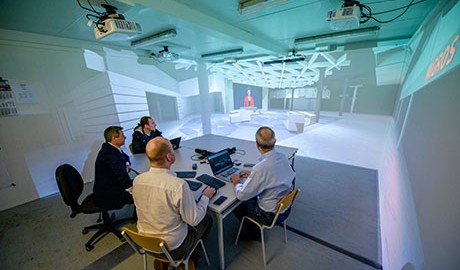New business models
Indoor-grown fresh vegetables thanks to robotics and 5G
Fresh vegetables are being grown at a warehouse at SBB’s Smart City Lab in Basel, from where they reach shops via the shortest possible route. How is this possible without any daylight at all? What role does 5G play in this? And what’s the connection between robotics and vegetable-growing?
Text: Michael Lieberherr,
The Wolfareal site in Basel hosts a warehouse that looks like hundreds of others across Switzerland. However, in this part of the former SBB freight depot, fresh vegetables are being grown that are then sold at a nearby shop shortly after harvesting. The vegetables are so fresh because they go on sale within hours of being picked.
Walking through the production halls, Marcel Florian, the founder and owner of Growcer, explains how he is developing the farm of the future. The vegetables are grown upwards in the hall, a procedure known as “vertical farming.” As a result, the hall within the former freight depot in Basel offers than 1500 square metres of cultivatable space on only about 400 square metres of land. According to Growcer, disused industrial buildings in urban areas could in future be used to grow and harvest vast amounts of vegetables, herbs and berries. Florian is convinced his idea will be a success: “In 2050, the global population will reach 9 billion, most of whom will live in cities. We must ask ourselves how we can supply these people with fresh produce on a daily basis. For this we should explore new avenues.” He primarily sees his role as that of a technology developer and supplier, though more of that later.
The perfect climate
Within the indoor farm, climatic conditions like light, temperature and humidity are adapted perfectly to suit the specific plants. Rather than shipping lettuce from 2000 kilometres further south in the off season, it is simply grown in the city in which it will be consumed – irrespective of the time of year. The goal is anticyclical production. This avoids imports and reduces food waste to a minimum. The plants are watered as part of a closed cycle that supplies them with nutrients in a targeted manner, thereby reducing water consumption by up to 90% in comparison to regular vegetable cultivation.
To ensure that white rocket, pak choi, the different leafy greens as well as regular rocket and berries can grow optimally, Growcer places great emphasis on technology and software. Creating ideal conditions is one thing. Automating the farm is another. After all, whereas a lot of manual labour is currently still required, the aim is to fully automate production using robots in the future. The processing of video data on the plants also plays a major part in controlling the robots appropriately.
5G provides the connection
Cloud computing and 5G play a key role in this. Such urban farms generate vast amounts of data for robot control and video recognition and that requires enormous amounts of processing power. All the processing takes place in the cloud. That’s where 5G comes in, forming the connection between the farm itself and the cloud. As Florian explains, “5G and the cloud help a start-up like us to begin very small and very lean. We can save money where it matters. After all, we don’t want to cut any corners with regard to the food.”
The start-up has recognised another advantage of 5G: flexibility. “We can replicate the Basel farm anywhere else. 5G lets us slash the cost of building another farm because we process and control everything centrally via 5G without having to install all the processing power on site at each individual farm.”
Farmer or software developer?
The Growcer model is setting an example. It's therefore hardly surprising that Growcer now also operates on the Arabian Gulf. Up to now, that region has relied heavily on imports, and its own food production is severely hampered by the energy-intensive job of supplying enough water. So will Growcer operate its own farms one day? “No,” says Florian. “We develop the technology and leave others to operate the farms. Incidentally, that can also be interesting for Swiss farmers who would like to supplement their production in the off season.”
This new mobile technology is opening doors for Growcer, a 5G pioneer, and actually makes the company’s business model possible in the first place. “I wanted 5G to be seen as a key technology and an opportunity rather than a threat,” says Florian, the visionary entrepreneur, adding, “You should pay closer attention to the advantages rather than holding on to prejudices.”

Newsletter
Would you like to regularly receive interesting articles and whitepapers on current ICT topics?
More on the topic:




